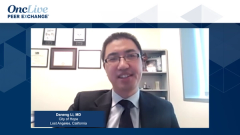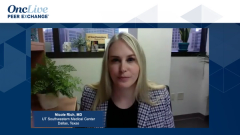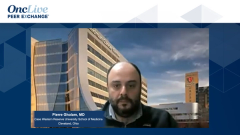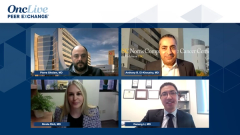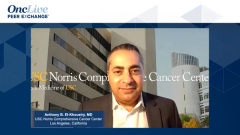
Patient Case: 63-Year-Old Woman With Advanced HCC
Drs Anthony B. El-Khoueiry, Daneng Li, Nicole Rich, and Pierre Gholam share treatment approaches for a 63-year-old woman who received an advanced HCC diagnosis with Child-Pugh A liver function.
Episodes in this series

Anthony B. El-Khoueiry, MD: Thank you all for this rich discussion. Let’s wrap up this session by discussing a hypothetical case that I’ll present to you all for you to give your opinions. This is a 63-year-old woman with chronic hepatitis B who’s on antiviral therapy. She developed some nonspecific nausea, abdominal discomfort, and was found to have abnormal liver function tests, which led to a CT scan that showed multifocal lesions in the liver as well as a large infiltrative lesion in the right lobe. There was an enhancing tumor thrombus in the right posterior portal vein. That’s adjacent to the infiltrative tumor. Incidentally, all of these except for the infiltrative lesion had enhancement and washout, meeting radiologic criteria for diagnosis of HCC [hepatocellular carcinoma]. There was also a bland-appearing thrombus at the splenic confluence and SMV [superior mesenteric vein], a nodular liver surface.
An endoscopy was done that showed portal gastropathy and small varices, too small for banding. The patient had never bled before. Her platelet count was 68,000 per mcL; AFP [alpha-fetoprotein] was 8,500 ng/mL; Child-Pugh A; albumin was 3.7 g/dL; and bilirubin was 1.8 mg/dL. Her liver enzymes are good, within range. Hepatitis B DNA is at 12. The diagnosis of HCC is made and the patient has Child-Pugh A function. She started an anticoagulation for the bland SMV thrombus as well. I’ll briefly go through all of you to see how you’d approach this patient, starting with Dr Li. How would you treat this patient first line?
Daneng Li, MD: This is a good case that we oftentimes might see in practice and highlights the need for a multidisciplinary team discussion, as Dr Rich and Dr Gholam highlighted. If we look at it purely from a data perspective, this is a patient who to me has advanced unresectable HCC with a vascular invasion, not in the main portal vein, and by criteria is open to the data that we have for all those patients in the frontline setting for advanced HCC. However, she is on anticoagulation, which was an exclusion from IMbrave150 with the combination of atezolizumab [Tecentriq] plus bevacizumab [Avastin].
The questions that come up is whether that anticoagulation can be stopped, and from her evaluation of the EGD [esophagogastroduodenoscopy] that Dr Gholam had highlighted, what her risk of potential significant bleeding is. If we feel the risk is relatively low, then I certainly wouldn’t have a problem giving her what I feel is still the best treatment in terms of overall survival, PFS [progression-free survival], as well as response, with the combination of atezolizumab plus bevacizumab. However, if it’s felt that this is potentially a patient who has that contraindication to bevacizumab and has significant bleeding risk, that would potentially favor a dual immune checkpoint inhibitor strategy in the frontline setting.
Anthony B. El-Khoueiry, MD: You mean with the tremelimumab and durvalumab [Imfinzi] study?
Daneng Li, MD: Yes, with those data.
Anthony B. El-Khoueiry, MD: Your thought process is outstanding. I’m going to pin you down a little. This patient is on anticoagulation. She walks into your clinic today. She’s already had that endoscopy that I mentioned. She just has small varices, no prior bleed. If I had you commit today, what would you do?
Daneng Li, MD: Like I said, I might stop the anticoagulation because I don’t know whether you truly need the anticoagulation for that bland thrombus. If I feel that we need to control the disease from a pure disease control perspective, I still believe that atezolizumab plus bevacizumab has a stronger data set compared with durvalumab plus tremelimumab. But if there isn’t the ability or we think that she does have that high bleeding risk in that multidisciplinary fashion, which I think is required to have that discussion, and it’s not just 1 individual making this decision, then I’d definitely go with durvalumab/tremelimumab in that scenario.
Anthony B. El-Khoueiry, MD: Very good. Dr Rich, would you do anything different?
Nicole Rich, MD: I completely agree with Dr Li. He brings up a great point about anticoagulation of portal vein thrombus in patients with HCC [hepatocellular carcinoma]. As you mentioned, this patient appears to have 2 different separate thrombus. Of course, if something is contiguous with the tumor, it’s enhancing, that’s tumor thrombus. There’s no indication to anticoagulated tumor thrombus, so from that standpoint, wouldn’t need the DOAC [direct oral anticoagulants].
For the bland-appearing thrombus that you mentioned that’s involving SMV and the confluence, I agree with Dr Li; I’d stop that. She has small varices and no significant ascites, so it doesn’t seem like she has clinically significant portal hypertension that she would need that attempt at anticoagulation, particularly if it’s a chronic thrombus, which I’m guessing this would be. The indication when I’d recommend continuing the DOAC at all costs or continuing the anticoagulation would be in patients whom we’re trying to transplant to keep the SMV open so that the surgeons will have targets for transplant. But in this patient, she’s got advanced HCC, so that’s less likely to be an option in her. I agree, I’d probably stop the DOAC and recommend she get either atezolizumab/bevacizumab or durvalumab/tremelimumab.
Anthony B. El-Khoueiry, MD: Very good. Dr Gholam, anything else?
Pierre Gholam, MD: I’ll try to stir the pot a little here. If the patient indeed has a clot that extends from the intrahepatic portal vein segment all the way out to the confluence, that would be one thing. That’s a patient who’s asking for some serious trouble in the coming few months. I’d bite the bullet and keep them on the DOAC. I’ll remind this audience that once upon a time, DOACs were relatively contraindicated in liver disease. It’s only recently that we’ve acquired a level of confidence and have become very comfortable using DOACs in this setting, usually at the lowest starting dose. That’s coming mostly from real-world evidence that DOACs are safe in liver disease. If the patient has an isolated partially occlusive thrombus just at the confluence, I’d agree with my 2 colleagues that this might be an unnecessary use of a DOAC in a patient who’s at risk for bleeding.
The second point is an assessment of the risk of bleeding in a patient with small varices. The Baveno VII guidelines, based on the portal hypertension meeting that just occurred that issues guidelines every few years that guide our practice, says that if you have small varices, the likelihood that you will bleed over the next 2 years from them is less than 10%. And if you have large varices, we shouldn’t be using that medium. That’s something we should shy away from using. If you have large varices, your risk of bleeding over the next 2 years exceeds 35%. That distinction between small and large makes a big difference. I’d be comfortable initiating atezolizumab and bevacizumab in this patient based on the data available to me. That’s a reasonable treatment approach with close follow-up.
Anthony B. El-Khoueiry, MD: Very good. Dr Rich, any response to that?
Nicole Rich, MD: The only other point I was going to make, which was unrelated to the DOAC discussion but related to this case, is the fact that the patient has hepatitis B and was recently started on antiviral therapy. In these cases where we can treat the underlying liver disease, that’s important. Particularly for hepatitis B, we can see significant improvements in portal hypertension very shortly after starting antiviral therapy. To Dr Gholam’s point, this patient may be at even lower risk of bleeding in a month or 2 because we see significant improvement in portal hypertension with hepatitis B. There also may be a role for treatment of hepatitis C in this case, which could be a discussion all on its own. But recognizing the underlying liver disease is important, particularly if somebody has hepatitis B, to start them on antiviral therapy.
Anthony B. El-Khoueiry, MD: Hence the importance of the theme that’s been repeating today: multidisciplinary care. That’s probably a good way to end our segment today about the importance of involving all the right specialties in the care of these patients. I’d like to thank you all for this rich and informative session. It’s exciting to see that the options for our patients with liver cancer are expanding. Every few months, we have new data coming out. It’s hard to keep up, but at the same time, it’s important to keep up with it and deploy these therapies in the best way we can for the sake of our patients. The opportunities for more drug development in this disease has also become a reality with more interest and attention from industry sponsors to bring new drugs to this space. These are certainly exciting times. Thank you again for your contributions.
Transcript Edited for Clarity


